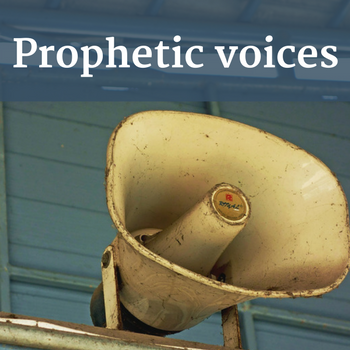
Prophetic voices
If your measuring stick is the number of phone calls to the bishop’s office in the NC Synod to register complaints about their pastor, the first week in February is the winner thus far in my 18-month tenure. The reason? The previous Sunday’s sermons on the Beatitudes (Matthew 5:1-12, “Blessed are the poor in spirit…”) and Micah 6:8, “What does the Lord require of you but to do justice, love kindness, and walk humbly with your God?”
My assumption is that had these texts been proclaimed as platitudes or ideals, they would have made for, in the eyes of most parishioners, a good sermon. Combined with the president’s Executive Order(EO) concerning refugees, they became challenging, polarizing words for many of our congregants. Like issues of sexuality, race, election, the environment, gender, and economic policy, if and when mentioned from the pulpit, the fallout was palpable.
“Bishop, I’ve told you that I’m not—and the church is not—interested in your political views, and would you please tell our pastors that we’re not interested in theirs, either?” This was one of the kinder phrases to grace my ears this past week.
I appreciate parishioners confronting their Christian sisters and brothers with whom they disagree. That means on some level they value our life and accountability to one another in Christian community. Secondly, they remind us of the culture in which we are the Church. The Barna Group’s State of Pastors survey, released January 26, states very clearly, that “Only eight percent of adults say they are interested in hearing pastors’ views on issues such as same-sex marriage, LGBT rights, abortion, guns, tax policy, climate change, drug policy or religious freedom.” There it is in black and white, clergy friends. Read it and weep. The study goes on to report, “There is a huge amount of skepticism and indifference to today’s faith leaders.” This is across the board—not just Lutherans, but all religious leaders.
An overwhelming number and variety of religious leaders and organizations preached sermons on and/or released statements against the recent ban on refugees. Whether they mentioned the president’s Executive Order or not, people heard it as political discourse. I’ve listened online to a number of those sermons, and most them never mentioned the president, the EO, or anything explicitly political at all, but people made the leap and assumption that saying “justice” (thanks, Glenn Beck) or “welcoming the stranger” or “inasmuch as you did it to one of the least of these,” equals political discourse. So what is your pastor to do, regardless of her political persuasions or opinions (in which I’m not particularly interested either, to be honest) with prophetic teachings and texts of our scriptures?
Our pastors mostly don’t choose the texts which we read on Sunday mornings. Mainline Christians and Catholics worldwide preach from a common pre-assigned lectionary cycle. One angry parishioner was upset that her pastor had “chosen” these particular Bible texts this past Sunday because of the EO on refugees. Not so. We’re all guilty of “eisogesis,” that is, taking our opinions and experience and reading them into the scriptures, cherry-picking the texts that support our culturally- or personally-formed sinful opinions. However, all of our Lutheran seminarians are carefully trained in “exegesis,” including learning the original scriptural languages of Hebrew (most seminarians) and Greek (all seminarians). Exegesis asks questions like, “to whom was this biblical author speaking?” “What was it trying in its own time to evoke from its hearers?” Most of all, “what is God saying to them, and now to us, through this text?” It’s like the old misguided prayer that I’ve heard offered in many a pre-Council meeting devotional: “Oh Lord, bless what we’re doing here.” You see the problem with that prayer? Shouldn’t we be praying, “Lord, help us to study your word and discover what you are blessing, and lead us to do those things”?
I know I was carefully trained as a preacher and pastor to consider three main “stories” that weave as strands into a common thread in the sermon: (1) My Story and Experience—not that the sermon is at all about me but that I am authentically present and testifying to relationship with God in Christ; (2) the Congregation’s Story, including what’s going on in the news (a la Niebuhr’s advice of the Bible in one hand and a newspaper in the other for every good Christian); and (3) most importantly, the Text’s Story, God’s Story, studied diligently and faithfully. So, for instance, if the text says “justice,” that’s what God wants to say to us. And what does justice mean in that context and now given what is going on in our world; how does God speak and call to us as Christians, having come to us first and foremost in gracious love and now calling us to follow (because… therefore; always grace first and God first)?
Should the Church BE political? Certainly not. Does the message of the scriptures, which form our core and conscience, have political implications? Of course it does and should! All of our views and actions, as baptized Christians called to be Christ-like, flow from that deep identity as God’s beloved children and our calling, as we promise in our affirmation of baptism, “to serve all people, following the example of Jesus, and to strive for justice and peace in all the earth.” If you’re a member of the ELCA, you’ve already promised that. Your preacher, I hope, is bound not to political opinion but to the witness of the scriptures. Yes, it gets messy if and when they lift up a prophetic voice (and yes, congregations control the preacher’s salary and 401K), but I must say that the bold pastors who both love their people dearly and are called to speak a prophetic, challenging word based in the scripture—which alienates some of their people–live with a huge dilemma. Look at the crowds that the Prosperity Gospel preachers draw. These preachers tell people what they want to hear. My sinful self desperately wants affirmation, even God’s affirmation, of what I think makes me secure, great, and first. Jesus and the prophets are going to make us uncomfortable. What would Jesus do?
These are challenging times. For the church to say nothing about what’s going on socially or politically would be, in my opinion, completely unfaithful. For the church to become primarily a political lobby or particular partisan position, which many believe has already happened, continues to plunge clergy into a sea of irrelevance.
Bottom line: Are the scriptures and the life, death, and resurrection of Jesus and the resultant freedom of the Gospel forming us and transforming us? Or is the culture, including politics and our sinful selves, doing that forming and transforming and then we proof-text the scriptures to justify ourselves?
Walking with you,
Bishop Tim Smith


